Concert Review
Sacramento Choral Society & Orchestra
Revelations of Love - October 21, 2017
Looking back over history, it’s probably a safe guess that more choral music has been written as an expression of religious faith than has been written on any other topic. But “love” has to be the second most popular subject. And the Sacramento Choral Society and Orchestra’s opening concert of its 22nd season, “Revelations of Love,” was an exploration of “love” from many perspectives.
This latest offering in SCSO’s “Stained Glass Concert” series was held, as many before, in the awe-inspiring sanctuary of Fremont Presbyterian Church, with the towering pipes of its magnificent Reuter organ dominating the view from every seat. And the first impressive feature of this concert was the organist. After a welcome by SCSO Board President James McCormick, organist Ryan Enright began a subdued, intensely beautiful organ solo. It turned out to be a processional as the 120-member chorus filed in slowly, even solemnly, from the right and left aisles of the church. As the organ music rose to a grand conclusion when the chorus was in place on the risers, I noticed Director Donald Kendrick glancing at Enright as if to suggest he cut the piece short. That seemed a little strange. Stranger still was the fact that the title of the piece was not in the program. It was only later that I learned that Ryan Enright has built a reputation as a master improviser, and he was supposed to play until the chorus was in place. I was fooled into believing that the processional was a fine classical composition that I would have liked to have heard again and again. But it had all been brilliantly improvised. (There should have been applause.)
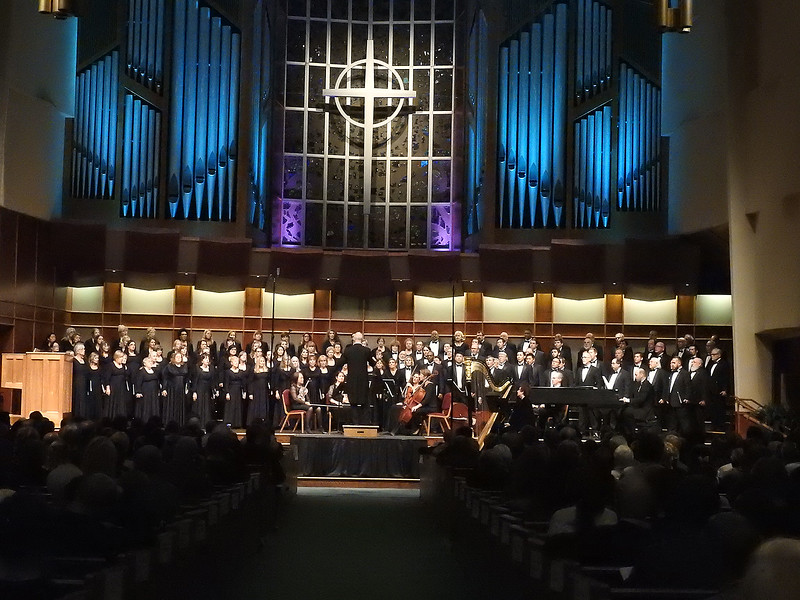 |
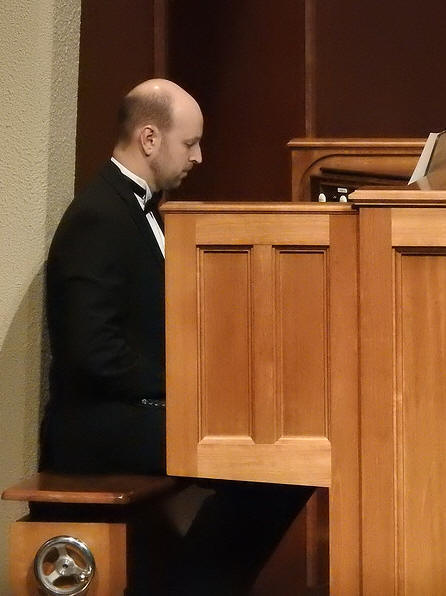 |
|
|
View from the audience |
Ryan Enright at the organ console |
(Click here to open the concert program in a new window.)
This concert was as eclectic as any I’ve heard from SCSO. Eight choral works were presented, all but two from living composers, and the program put them into sections of one or two works, titled: Love’s Journey, Love’s Nostalgia, Love’s Sacrifice, Love’s Solitude, and Love’s Eternity. Although I didn’t understand its category, “Love’s Journey,” the first selection, “O Love Divine,” was a delight. Accompanied by organ and string quartet, it was unmistakably Handel. And it seemed to me that it was performed with restraint and great attention to detail. Though the words were in the program, I didn’t need to consult it because they were clearly articulated, as were the delicate melismata (runs). Also, I found myself able to follow the alto line (a tribute to the quality of that section and the balance within the chorus). In all, the piece was a gem that could have been recorded on the spot for appreciation by posterity.
For “Luminous Night of the Soul” by Ola Gjeilo, Enright moved to the piano, and the piece began with a luscious cello solo that seemed to me lovingly performed. I then perceived a new depth to the sound of the chorus — not in volume (though that came), but in richness. Next was a lovely piano solo that emphasized the reflective nature of the piece. And then the chorus entered humming, as if to highlight the beautiful harmonies. As the passion built in the third verse, I lost the words in the counterpoint, but I was able to follow them in the program. It began to strike me that this was a musical painting of many distinctive elements: vocal and instrumental solos, different musical styles, etc. It was the kind of painting that invited one to observe it for a long time to fully appreciate the artistry of its construction. I want to add that, though good music doesn’t have to be beautiful, the sheer beauty of these first two pieces was arresting and oh-so satisfying.
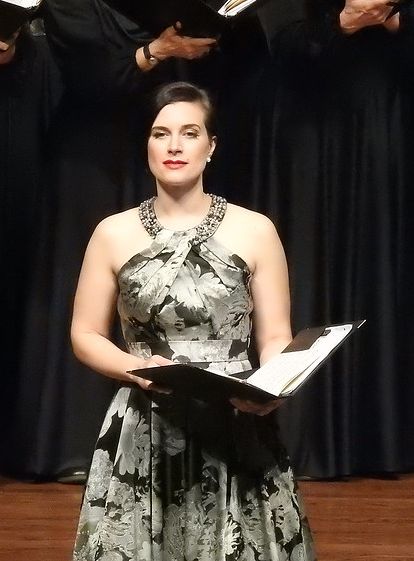 |
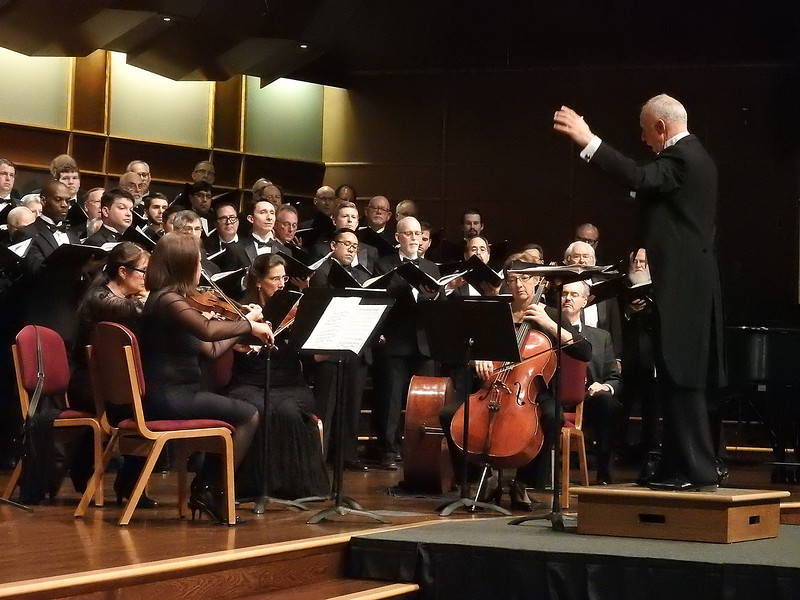 |
|
|
Hanna Penn |
SCSO Chamber Ensemble |
To mark the distinct change in the music to be performed, narrator Elizabeth Anne Springett came forward to give a carefully scripted introduction to the next piece, John Corigliano’s setting of the 6th stanza of Dylan Thomas’ “Fern Hill.” She read part of the poem, and gave background on Dylan Thomas and the poem itself — a framework for appreciating what was to follow (see Note 1 below). With accompaniment by string quartet, plus bass and piano, Corigliano’s music was distinctly contemporary, music that doesn’t lull you but asks (sometimes demands) that you pay attention to the passing images and feelings. I looked around at my fellow concert-goers. A few were following the words in the program, but most were sitting back, allowing themselves to be led on the journey of reminiscence by poet and composer. Part of the performance was given as a solo by mezzo-soprano Hannah Penn, who presented a strong, cultured tone as she gave life to her part of the story.
Overall, I found the music not pretty, but engaging. “Fern Hill” is dense with imagery and emotion, and then the composer compounds all that with his choice of dynamics, musical style, repetition of words, etc. The poem gives one a lot to think about, the music much more. It was almost too much for the woman sitting behind me who gave an involuntary sigh of release (and appreciation) as the piece concluded.
I think there must be some poignancy in every song about love, but in none so much as a song about love interrupted by war. That was true of “After the War” by Mark Sirett. Once again, Elizabeth Anne Springett took the stage to set up this piece by reading a letter from a young woman to her fiancé who had gone off to fight in World War One — before she learned that he had been killed. As I listened to the chorus singing this touching piece, passing the theme between men and women and chorus member Ryan Antonelli delivering a fine solo, I had a thought. It seemed to me that they were singing from the heart, with careful attention to the words and the blend of their voices — all of that emphasized and aided by the fact that the piece was performed from memory.
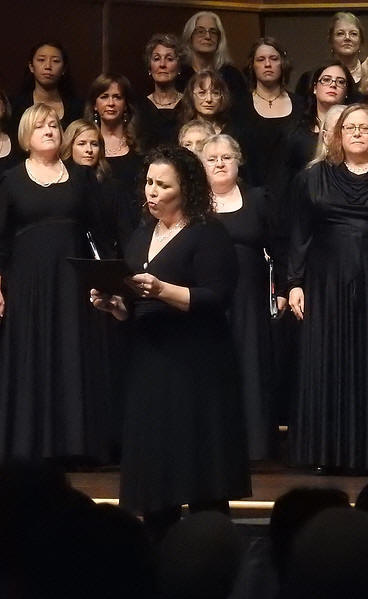 |
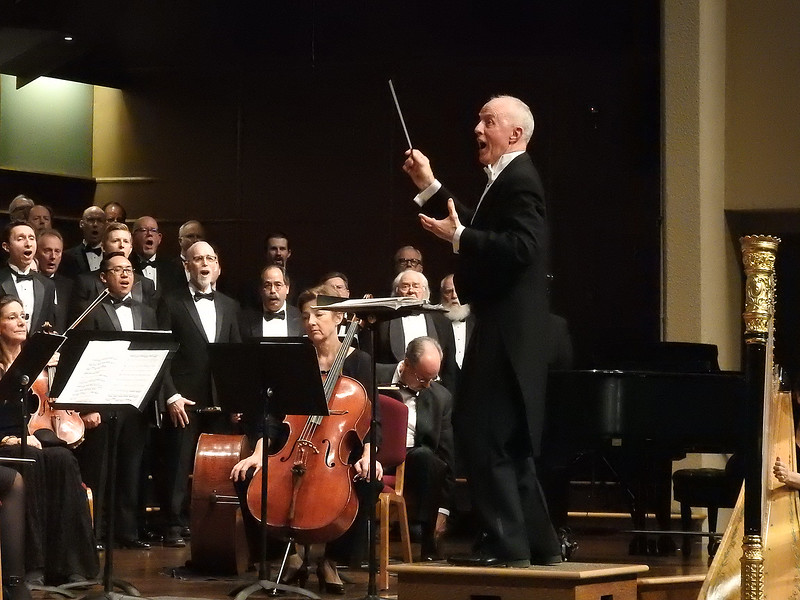 |
|
|
Elizabeth Anne Springett |
Director Donald Kendrick |
The sadness of “After the War” was followed by the optimism of John Rutter’s “The Gift of Each Day.” I noted that it was composed — or at least published — in 2015, Rutter’s 70th year, and a time when those of us who reach that milestone indeed appreciate each day as a gift. It was essentially a song of praise — a different kind of love. The music was simple compared to Rutter’s other works, but it was thoughtfully performed and — to me at least — inspiring.
The sadness was not over, though. There were two selections from Michael Gandolfi’s “Winter Light.” The first, “Falling Snow,” captured the sadness of loss. Then “Opal” was full of the agitation created by the interplay of anxiety and joy in a budding romance. I haven’t mentioned the continuing contribution of the string quartet throughout this concert, but in this latter piece especially, it seemed to me that they delivered a virtuoso performance.
The last section of the concert, “Love’s Eternity,” was introduced once more by narrator Elizabeth Anne Springett. The text was essentially about God’s love for man, clearly a very personal statement that described the Bible as “a love letter from God to us” and urged everyone to “use your earthly time wisely to understand love.” (In my notes I wrote “Who wrote this good stuff!”) Then the narration ended with a brief citation from the second chapter of Song of Solomon that led to Alan Bullard’s “Rise Up, My Love,” which draws its text from that chapter.
The concert concluded on a classical note with two movements from Haydn’s Lord Nelson Mass, “Et Incarnatus” and “Et Resurrexit.” Especially considering the preceding narration, I could see the logic of this selection. And the music was grand! “Et Incarnatus” included a quartet formed by mezzo Hanna Penn and yeoman work by 3 chorus members: Jerri Meier, Douglas Ferreira and Timothy Mascarinas. Penn again demonstrated her vocal agility, and the chorus produced disciplined, accurate singing. Then the exhilaration of “Et Resurrexit” took over, bring this concert to a high-spirited climax. To me, this music of Haydn goes beyond an expression of religious faith. The harmonies and rhythms reach out to touch something fundamental, even visceral, in each of us. That’s why this music has survived through the centuries and is even now loved by so many.
But it wasn’t just the exuberance of the Haydn mass that galvanized the audience into applause, a standing ovation, and what I would consider at least one “curtain call.” They had been given a well-crafted selection of classical and neoclassical music, expertly performed, with the encouragement to reflect on “love” — as Henry Drummond wrote over 120 years ago, “the greatest thing in the world.”
Note 1: This concert was dedicated to the memory of Betty Graham. See the tribute on page 6 of the concert program.
Note 2: The three narrations were researched and written by Director Donald Kendrick. Although professionally delivered by accomplished actress, Elizabeth Anne Springett, I struggled to absorb the ideas they presented and keep them in mind for the music that followed. Kendrick has graciously allowed me to append them to this review. Whether you were present at the concert or not, consulting them will give you a better understanding of the thinking behind this concert. (Click here to open the text of these narrations in a new window.)
Note 3: This concert marked the release of SCSO's latest CD, "Rossini & Mendelssohn." Click here to go to the information page on the SCSO website.